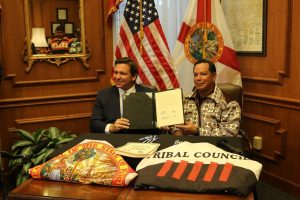On Friday, Federal regulators allowed the controversial gambling agreement between the state of Florida and the Seminole tribe to take effect. With the approval from the feds, sports betting in the state can now begin taking bets as early as October 15, assuming the deal can successfully navigate the many hurdles that remain. The deal has received a lot of criticism from officials throughout the state, including scrutiny in the form of lawsuits. Now, a number of challenges stand between the proposed sportsbooks and the launch of sports betting in the Sunshine State.
The Deal and the Controversy
The deal under question was ratified by legislators and signed by Gov. Ron DeSantis and Seminole tribe Chairman Marcellus Osceola Jr. in May. The compact was the result of tireless efforts from law makers and gaming enthusiasts who have been pushing for some form of gaming expansion in the state over the past few years. Under the deal, anyone over the age of 21 will be able to place online wagers on sporting events through online sportsbooks or mobile applications. Brick-and-mortar sportsbooks would also be permitted at existing Seminole casinos, which currently operate on reservation lands.
Under the Indian Gaming Regulatory Act and Florida law, all gambling in the state must be conducted on reservation land. The new compact, however, would bypass this law by giving the Seminole tribe control over the servers that would be handling all the mobile and online sports wagers. With online and mobile sports betting, bettors would be able to place their bets remotely, even from the comfort of their own homes. In return for complete control over sports betting, the Seminole tribe will guarantee at least $500 million in annual revenue payments to the state for the next 30 years.
Under the new compact, sports betting can begin in October. At that time, the tribe will be able to take sports bet at the six casinos located on their tribal lands. In addition to these brick-and-mortar sportsbooks, Florida’s existing racetracks and jai-alai frontons will be given permission to develop their own mobile sportsbook apps and conduct their own sports betting using the Tribe’s servers.
The deal has caused quite the stir, as it gives the Seminole tribe complete control over sports betting through a questionable loophole in the law. So far, the deal is already facing a lawsuit that is pending in federal court. Additionally, there are at least two ballot initiatives that have been launched in an attempt to counteract the deal, offering alternative sports betting options and blocking some of the expansion of casino games. Despite these hurdles, the Department of Interior did not lend their voice to the rising concerns surrounding the compact.
The Seal of Approval
The Department of Interior officially released a 12-page letter outlining their opinion of the State’s controversial deal with the Seminole tribe on Friday. The letter revealed that the department will neither approve nor deny the compact. Yet the letter went on to state that “the Compact is considered to have been approved by operation of law to the extent that it complies with the Indian Gaming Regulatory Act and existing Federal law.” The letter is expected to be published in the Federal Register sometime next week, making the compact effective immediately after.
Bryn Newland, principal deputy assistant secretary of Indian Affairs, shared that the department’s decision should come as no surprise given the way that evolving technologies have spurred the growth of sports betting throughout the United States. Other states have faced similar questions about where betting should be permitted, given the fact that mobile wagers open the door for bettors to place their bets on land that was not previously set aside for gambling. Newland noted that many states have already enacted laws that deem a bet to have occurred at the location of the servers, meaning that Florida’s new compact would not be in violation of any existing laws.
Challenges Ahead
The Department of Interior may have paved the way for the deal to finally bring sports betting to Florida this October, but not without a catch. The department raised a few minor concerns with the compact, as detailed in the letter they released. The first of these is that the department does not support the idea that the Seminole tribe should contract with “Qualified Pari-mutuel Permitholders” in order to provide marketing for the Tribe’s sportsbook. The department was also critical of the deal’s handling of tort remedies for patrons, claiming that the proposed processes for handling patron disputes could not be upheld under the state’s existing laws.
Among those questioning the compact are some of the industry’s leading sports betting companies, including Las Vegas Sands, FanDuel, and DraftKings. The trio of gaming giants have put millions of dollars into various ballot efforts to influence the direction of sports and casino gambling in the Sunshine State. Las Vegas Sands is working to get voter approval on three new casinos, while also expanding card rooms to offer casino games. Meanwhile FanDuel and DraftKings have been working on a constitutional amendment that would allow voters to vote in favor of alternative sports betting options other than the ones made possible through the State’s deal with the Seminole tribe.
A sports betting expansion remains a priority for lawmakers and officials throughout the state, however many are fearful that if the compact could give the Seminole tribe a monopoly in an industry where everyone wants a piece of the pot. Even if the compact makes it to launch without facing significant challenges in court, it is possible that other challenges could still lie ahead.